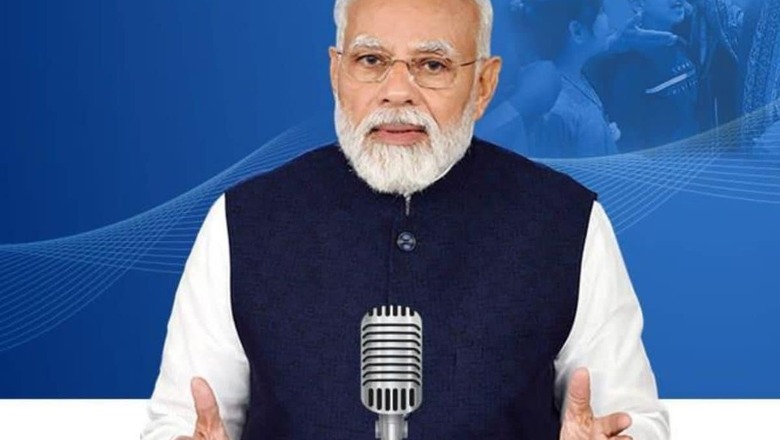
views
Mann Ki Baat has been steadfast in nudging behavioural changes, shaping societal attitudes and breaking taboos. While much of the mainstream attention has been on the macro issues and community action on the big campaigns, it is noteworthy how PM Modi never lost sight of the small issues—the little things that matter to those at the margins of society.
Taking the message of inclusion within communities beyond charitable activities, Mann Ki Baat has spoken about fundamental changes in attitudes, where the spirit of inclusion is deepened within communities and families are sensitized to be inclusive in different aspects of everyday life. Reflecting this was PM Modi’s call to action in October 2020, ahead of the first festival season during the Covid-19 pandemic, which saw extended periods of lockdown. With the pandemic impacting local businesses and service providers, PM Modi called upon communities to be vocal about shopping local to support the local businesses, while also urging families to spare a thought for the local service providers who continued to provide essential services during the lockdown. From sanitation workers and domestic help to local vegetable vendors, milkmen and security guards, PM Modi encouraged making all who provided essential services without a break a part of the festivities. In his plea to the communities to consider them as members of the family, inclusion became a mantra for healing the fabric of society that was frayed by the pandemic’s devastating effects.
भगवान विश्वकर्मा की जयंती पर अपने सभी परिवारजनों को बहुत-बहुत बधाई। इस अवसर पर अपनी लगन, प्रतिभा और परिश्रम से समाज में नवनिर्माण को आगे ले जाने वाले सभी शिल्पकारों और रचनाकारों का हृदय से वंदन करता हूं। pic.twitter.com/QoxoUN7Gug— Narendra Modi (@narendramodi) September 17, 2023
It is perhaps a reflection of his own life journey and the formative experiences from his early life that he not only ensured these little things received national attention through Mann Ki Baat but did so with a mantra of positivity rather than through emotions of victimhood.
It was these very formative life experiences that manifested themselves in his call to action in August 2017, when he urged citizens to resist the temptation to haggle and bargain with small vendors, over a few rupees. Striking an emotive tone, he asked his listeners to think about what may be going through the minds of the small vendors when the well-to-do haggle. Expressing deep empathy for these small vendors who are at the receiving end of such behaviour, he spoke about the feeling of hurt over questioning the honesty of the vendor and the heartache caused by such pettiness within society. Readers will also recall an earlier instance when PM Modi called on families to be inclusive while celebrating festivals.
The profoundness of these remarks needs to be understood from the vantage point of a younger PM Modi growing up in a humble household, observing societal behaviour and absorbing its vicissitudes; while his mother worked as a domestic help to make ends meet and his father vended tea at the railway station to make a living. It is to the credit of values inculcated during his formative years that empathy and positivity took root within him, to inspire and lead a mass movement for societal change many decades later from politics to parliament.
Over the years, Mann Ki Baat has emerged as a platform for janbhagidari or community participation. When the PM spoke about Indian toys, the communities that were directly involved in toy making not only saw an immediate socio-economic impact, but also found themselves embracing digital commerce and reducing India’s dependency on imports and thereby becoming agents of change. There have been many such moments over the almost-hundred-episode saga of the programme, in which public participation and collective effort have played a significant role. Celebrating traditional craftmanship to rediscover the cultural roots of sustainability, in August 2021, Mann Ki Baat dwelt at length on Vishwakarma Jayanti, the birthday of Vishwakarma who, within the Hindu pantheon, is regarded the divine architect and craftsman.
Bhagwan Vishwakarma is considered as a symbol of the creative power behind the genesis of the world. Whoever through their skill, builds an object…innovates… whether it is sewing-embroidery, software or satellite, all this is a manifestation of Bhagwan Vishwakarma. Even though skill is being recognized in a new way in the world today, our sages and seers have emphasized on skill and scale for thousands of years. They have interlinked skill, talent, ability with faith, thereby making it a part of the philosophy of our lives.
Our Vedas have also dedicated many sukta to Bhagwan Vishwakarma. Whichever great creations are there, whatever new and big works have been done, our scriptures ascribe them to Bhagwan Vishwakarma. It is in a way a symbol of the thought that whatever development and innovation is happening in the world happens only through skills. This is the very sentiment behind the birth anniversary of Bhagwan Vishwakarma and his worship.
And this has been quoted in our scriptures too.

The one who takes all efforts in the process of creating and building is a Vishwakarma. In the view of our scriptures, all the skilled, talented people around us engaged in the process of creation and building are the legacy of Bhagwan Vishwakarma.
The writer is the former CEO, Prasar Bharti. Views expressed in the above piece are personal and solely that of the author. They do not necessarily reflect News18’s views.
















Comments
0 comment